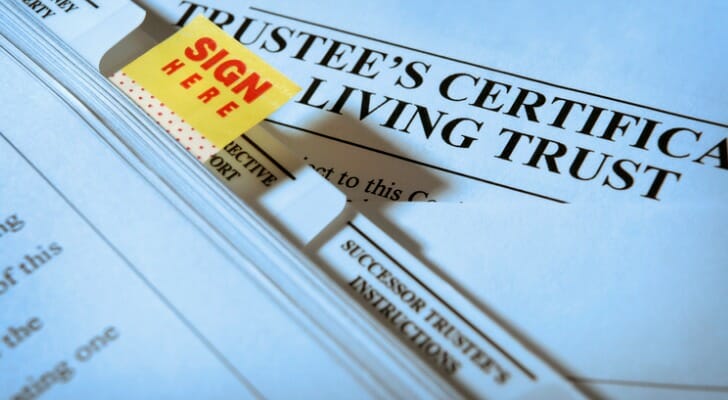

Understanding what you need to support your loved ones during and after your life can be a daunting task. Especially when it comes to the issue of assets and finances. Many people take steps like setting up a will or trust through a financial advisor. But beyond those legal agreements, a question arises about whether special financial vehicles are necessary. In the case of a trust, it is possible to use a tool called a trust bank account.
Trusts and wills are both estate planning tools but they serve different purposes. A will is a legal document that outlines what happens to your assets after you die. A trust, on the other hand, is a legal entity into which assets are placed. This entity technically owns your assets, with a trustee managing it. A trust involves a grantor, trustee and the beneficiaries. Trusts can also be revocable or irrevocable – the first can be amended or even folded, while the latter are permanent.
With a trust bank account, a person or entity controls the assets in the account on behalf of a third party or beneficiary. It allows grantors to set terms for how they want assets managed and eventually distributed to beneficiaries. (One example is setting up an account to pay property taxes or to create a college tuition fund.) In this case and in general, trust processes are useful in avoiding the probate process that a will must go through, which can cost a lot of money and time.
Trust bank accounts hold the assets, but funds can be used for paying expenses during the distribution of the trust. Having a separate account makes it easier to move funds into the accounts and keep track of related expenses. Being able to disperse funds quickly and easily is important, especially if the trust was created to handle immediate needs, like the death of a parent or guardian, or urgent medical expenses.

To open an account like this, you’ll need to first determine that your bank offers these types of accounts, then gather documents and fill out an application. If they are offered, you should ask about much of the information that you might otherwise ask about any bank account: whether there are any balance requirements, fees, minimum opening deposits, etc. Documents you’ll need might include valid identification, tax forms, the name of the trust and any other current information about it. In some cases, you may even be able to convert an existing bank account into a trust account.
Since a trust bank account is a deposit account that can be opened by a trustee for the benefit of a beneficiary, it protects assets during and after the grantor’s life. As such, it must have a specific purpose, designated beneficiary and list out specific duties for the trustee as per the grantor’s wishes. Opening the account will require the actual written trust with a Social Security or tax ID number. (It may also require the services of an attorney.)
This means that whether or not a grantor opens a trust checking account to fund it for the beneficiaries or prepare it for a trustee, the trust agreement must first be created along with what’s called a certification of trust (a shortened version of the full trust agreement generally used in official paperwork). Only the grantor or settler of the trust and their trustees are authorized to create a trust checking account.
There are many ways to fund a trust checking account. The grantor or trustee will have to fund the account by personally depositing the funds from whatever source is available to them, according to the plan set by the trust. Other ways to fund a trust include savings accounts, life insurance payouts, retirement funds, etc.
The trustee and grantor should talk about how the account should be funded so that the trustee can act according to the grantor’s wishes. Only a designated trustee will be able to access a trust checking account. Expenses that they might need to be mindful of include debts, utility bills, real estate taxes, other taxes, insurance fees and attorneys fees – just to name a few. Because this is essentially a bank account, it will be FDIC insured, but the amount insured depends on a few factors, including the type of trust.

A will is important to have in order to convey what should happen to your assets after you pass away, but if you require a financial account to manage assets on behalf of your beneficiaries, a trust and trust bank account might be more appropriate for you to consider. Talk to your bank representatives and/or a financial advisor to see if this approach is right for you.
Photo credit: ©iStock.com/YinYang, ©iStock.com/courtneyk, ©iStock.com/DNY59
Nadia Ahmad, CEPF®Nadia Ahmad is a Certified Educator in Personal Finance (CEPF®) and a member of the Society for Advancing Business Editing and Writing (SABEW). Her interest in taxes and grammar makes writing about personal finance a perfect fit! Nadia has spent ten years working as a seasonal income tax assistant, researching federal, state and local tax code and assisting in preparing tax returns. Nadia has a degree in English and American Literature from New York University and has served as an instructor/facilitator for a variety of writing workshops in the NYC area.
Read More About Estate Planning



More from SmartAsset
SmartAsset Advisors, LLC ("SmartAsset"), a wholly owned subsidiary of Financial Insight Technology, is registered with the U.S. Securities and Exchange Commission as an investment adviser. SmartAsset's services are limited to referring users to third party advisers registered or chartered as fiduciaries ("Adviser(s)") with a regulatory body in the United States that have elected to participate in our matching platform based on information gathered from users through our online questionnaire. SmartAsset receives compensation from Advisers for our services. SmartAsset does not review the ongoing performance of any Adviser, participate in the management of any user's account by an Adviser or provide advice regarding specific investments.
We do not manage client funds or hold custody of assets, we help users connect with relevant financial advisors.
This is not an offer to buy or sell any security or interest. All investing involves risk, including loss of principal. Working with an adviser may come with potential downsides such as payment of fees (which will reduce returns). There are no guarantees that working with an adviser will yield positive returns. The existence of a fiduciary duty does not prevent the rise of potential conflicts of interest.